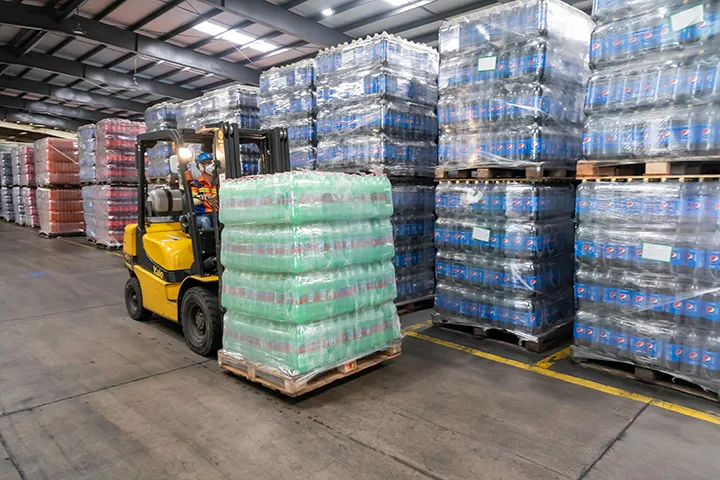Operating a forklift is a high-responsibility job. These powerful machines are essential in many workplaces across Ontario, but they also come with serious safety risks when operated improperly. Ensuring operators are fully trained and competent isn’t just a best practice—it’s the law.
At Safety Training and Consulting Services Ltd. (STC), we’re committed to helping Ontario employers meet their legal obligations and keep their workplaces safe through comprehensive, CSA-compliant forklift operator training.
In this guide, we’ll explore:
- Legal requirements in Ontario
- CSA B335:25 – The newest forklift safety standard
- What proper forklift training includes
- Recertification and training frequency
- Responsibilities of employers and operators
- Practical safety and training implementation tips
- Why STC is your trusted training provider
- How to get started
1. Forklift Training Laws in Ontario
In Ontario, forklift safety is governed by the Occupational Health and Safety Act (OHSA) and applicable regulations for your industry, such as Regulation 851 – Industrial Establishments. These laws require employers to ensure that workers using powered lift trucks (commonly known as forklifts) are “competent”—meaning they’ve received proper training, understand applicable safety procedures, and can operate the equipment safely.
According to Section 25(2)(a) of the OHSA:
“An employer shall provide information, instruction and supervision to a worker to protect the health or safety of the worker.”
Forklifts are considered lifting devices under the OHSA, and anyone operating one must demonstrate competency through both theory and hands-on practical training.
Employers are also responsible for keeping training records and ensuring that certification is up to date.
2. CSA B335:25 – Canada’s Latest Forklift Safety Standard
In May 2025, the Canadian Standards Association released the latest edition of CSA B335:25 – Safety Standard for Lift Trucks. This new version replaces CSA B335-15 and introduces updated best practices for both training and safe operation.
Key updates in CSA B335:25 include:
- New guidelines for hazard identification and risk assessment
- Enhanced safe operating procedures for various environments
- Provisions for hydrogen fuel cell refueling
- Updated forklift classifications, including rough-terrain and narrow-aisle trucks
- Use of virtual reality (VR) or simulation technology for training
- Refined trainer qualification standards
- Clearer direction on exclusion zones and pallet hazards
- Expanded guidance on inspection and maintenance
The CSA standard isn’t law in itself, but in Ontario it is widely used as a recognized best practice, and inspectors often expect training programs to align with its requirements. At STC, all forklift certifications we deliver fully adheres to CSA B335:25.
3. What Forklift Training Must Include
Forklift operator training isn’t just about teaching someone to drive a lift truck. It must cover:
A. Theory (Knowledge-Based Instruction)
Delivered in a classroom or online, the theory portion of training should include:
- Legislation and regulations (OHSA, CSA B335:25, workplace-specific policies)
- Forklift design, stability, and load capacities
- Pre-use inspections and maintenance responsibilities
- Safe operating techniques, including:
- Traveling with and without a load
- Turning, reversing, and navigating ramps
- Load handling and stacking
- Pedestrian awareness
- Use on inclines or elevators
- Use of forklifts for personnel lifting (if applicable)
- Hazard awareness and emergency response procedures
B. Practical Training (Hands-On Skills)
This portion includes:
- Equipment familiarization
- Pre-operational inspections
- Operating in actual or simulated environments
- Load pickup, transport, stacking/unstacking
- Emergency shutdown and troubleshooting
- Workplace-specific challenges
C. Evaluation & Documentation
Operators must pass both a written test and a practical evaluation before they are considered competent. Employers must keep detailed records of the evaluation, dates of training, and the equipment type covered.
4. Recertification and Refresher Training
Under CSA B335:25, forklift operator certification is valid for three years. After that, refresher training and a full re-evaluation are required to maintain competency.
However, recertification may be needed sooner if:
- The operator is involved in a near miss or accident
- They are assigned to a different type or class of forklift
- There are changes in workplace layout, conditions, or hazards
- A supervisor observes unsafe behaviour
- Legislation or standards are updated
At STC, we offer convenient recertification programs designed to update operators on the latest legal and safety developments while validating practical skills.
5. Responsibilities of Employers & Operators
Employer Responsibilities:
- Ensure only trained and certified personnel operate forklifts
- Provide access to CSA-compliant training
- Maintain training records and forklift certifications
- Conduct hazard assessments in the work area
- Implement and enforce forklift operating procedures
- Schedule and manage refresher training every three years (or sooner)
Operator Responsibilities:
- Participate fully in all training and evaluations
- Conduct daily pre-operation inspections
- Follow safe operating procedures at all times
- Report hazards or equipment defects immediately
- Operate only the classes of forklifts they are trained on
- Wear appropriate PPE and use safety restraints
Both parties must work together to maintain a culture of safety.

6. Best Practices for Forklift Safety and Training Implementation
Implementing forklift training effectively requires attention to your workplace’s unique needs. Here are some best practices:
- Identify the forklift classes used on site (e.g. Class 1: Electric Counterbalance; Class 7: Rough Terrain)
- Use blended forklift certification formats: classroom, online modules, and hands-on practice
- Customize training to match workplace layout, loads, and hazards
- Ensure trainers meet CSA B335:25 Clause 7.2 standards for qualifications
- Keep inspection checklists and SOPs updated and accessible
- Post clear traffic routes, exclusion zones, and signage for forklifts
- Conduct regular hazard assessments
- Schedule recertification reminders and maintain digital or paper training logs
STC supports your implementation efforts with ready-to-use training documentation, checklists, and expert consulting.
7. Why Choose STC for Forklift Certification?
At Safety Training and Consulting Services Ltd., we’ve been helping Ontario companies stay compliant and keep their workers safe for over 10 years.
Here’s what makes STC different:
- ✅ CSA B335:25-Compliant Programs – Fully aligned with the latest national standard
- ✅ Certified, Experienced Trainers – Meeting or exceeding CSA Clause 7.2 requirements
- ✅ Flexible Delivery – Onsite and in-classroom (virtual upon request)
- ✅ Workplace-Specific Training – Tailored to your equipment, layout, and job demands
- ✅ Digital & Paper Records – We help maintain compliant records for inspections
- ✅ Recertification Made Easy – Quick and efficient refresher courses
- ✅ Full Consulting Support – Hazard assessments, SOP creation, and compliance audits
Whether you operate a single forklift or manage a large fleet across multiple facilities, STC provides the expertise and flexibility you need.
8. Ready to Book Forklift Training?
Forklift safety is too important to take chances with. Injuries, property damage, or regulatory fines are costly and preventable. Get your team properly trained—and stay in compliance with Ontario law and CSA standards.
STC is your trusted partner in forklift safety.
We’ll help you:
- Schedule new operator training
- Plan recertification programs
- Align your safety program with CSA B335:25
- Stay ready for any Ministry of Labour inspection
Final Thoughts
Forklift training is more than a checkbox—it’s a crucial part of any safety management system. With the release of CSA B335:25, it’s the perfect time to reassess your training program and ensure full compliance.
At STC, our goal is simple: make your workplace safer, more efficient, and fully compliant.
Contact us today and take the first step toward a safer operation.
